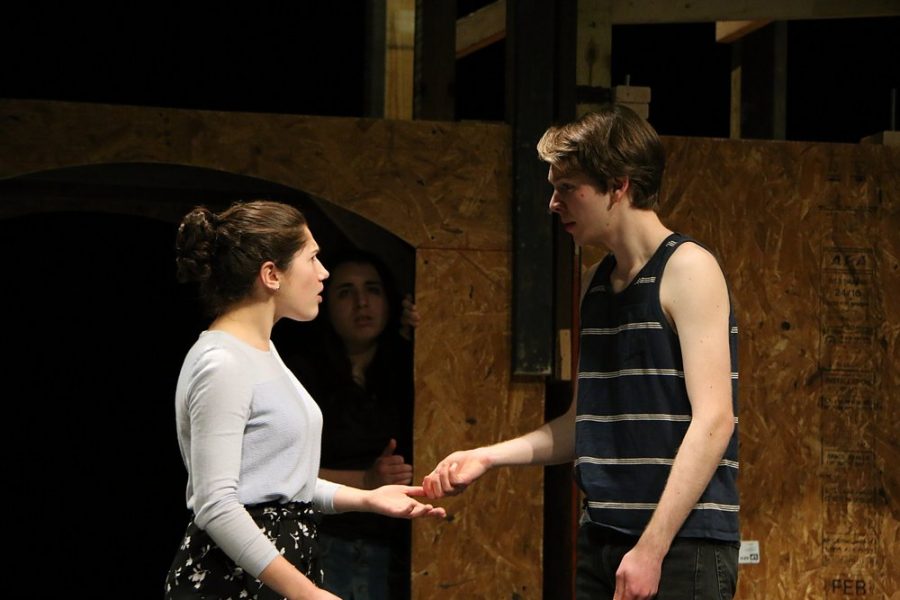Jefferson Drama’s “Les Misérables” explores complexities of human morality
Jennifer Steele, who played Éponine, and Evan Strong, who played Marius Pontmercy, rehearse a scene from “Les Misérables” before the show. Photo courtesy of Patty Vitsupakorn.
March 26, 2017
Rows of actors and actresses took their last bows as the red curtain shut, and the audience stood in thunderous applause. The musical “Les Misérables,” directed by drama teacher Jennifer Lowery, was performed by Jefferson students on Mar. 24-26, Mar. 31, and Apr. 1.
“It’s the story of many characters, mainly Jean Valjean, who was a convict for 19 years for stealing a loaf of bread, and he’s released and makes up for his crimes by helping students with their revolution,” freshman and ensemble member Howard Malc said. “It’s kind of hard to explain because there are many subplots in the story, making it really complex.”
“Les Misérables” explores internal battles that challenge the characters’ moral consciences. Assistant director and Jefferson senior Natasha Shukla carefully studied these battles in the play in order to highlight their message to the audience.
“One of the main conflicts is this balance between duty to your community and duty to yourself, as in what’s right and what’s moral,” she said. “You just have to step back, and kind of allow there to be a grey area, and not try to fit everything into a puzzle piece or into a mold because when you incorporate that complexity, that’s when you get the clearest answers, and that’s when you get to the situation with the most clarity.”
In “Les Misérables,” the main character, Jean Valjean, spends his whole life searching for redemption and fleeing from his dark past. This inner struggle is the driving force behind many of Valjean’s actions throughout the story.
“Jean Valjean, himself, feels guilty his entire life about something he did a long time ago. In my opinion he’s made up for it, and I think that he should not feel guilty [for it] anymore, but he still continues to, and his entire life is like this chip on his shoulder, and he feels bad about it. I relate to that a lot in just, always feeling like you have to make up for the things you do, always making sure you’re in line, and just, staying in your lane to go with the crowd,” Shukla said.
Set during nineteenth century France, where the people and government are in a state of unrest, Shukla believes that many of the conflicts in “Les Misérables” are resolved in ways that could be applied to some of the struggles in the world today, especially with the strong polarization of political beliefs.
“I feel like if we allow for more communication, and more understanding on each side, not necessarily agreeing, but understanding, people would benefit a lot, and a lot of characters in the show do that — they take that moment to hear the other side,” Shukla said.
Because the directors and the cast aspired to capture these complex elements of the plot of “Les Misérables,” producing the show took months of work and effort from participating students. This large-scale production was a new experience for several of the more than 50 students involved.
“I mean, every show is different in some way, but this was a really big show compared to what I have done in the past, and there are a lot of set and costume changes to take care of throughout the performance,” Malc said.
Throughout the first show, the audience frequently broke out in resounding applause, with a standing ovation at the end, showing their enthusiastic reactions to the hard work put into the performance. Though the auditorium wasn’t completely full, students who did attend praised the show.
“I thought the whole production was really fun and amazing to watch,” freshman Hana Wong said. “The actors and actresses who played Jean Valjean, Éponine, and Marius were phenomenal, and the plot itself really had a lot of meaning because it delves into some interesting moral conflicts. Overall, I thought it was a great success for the drama program.”






